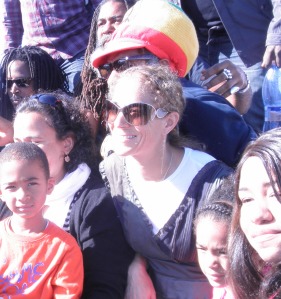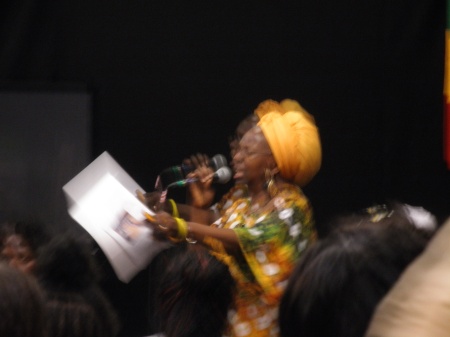 (Malcolm Jiyane at Afrikan Freedom Station)
(Malcolm Jiyane at Afrikan Freedom Station)
“To be free is not merely to cast off one’s chains, but to live in a way that respects and enhances the freedom of others.” Nelson Mandela
The Afrikan Freedom Station’s founder and freedom dreamer, Steve Kwena Mokwena hosted our first Bad Friday screening in Johannesburg. He handed me the venue’s postcard which features his original painting of a bright red heart with what looks like planks of wood across it…any building must have the foundation of love? That’s my read. On the back of the postcard, the gallery and performance space describes its mission like this:
WE ARE AT THE CROSS ROADS OF A NEW AFRIKAN CONSCIOUSNESS. This is the place where those who want POSITIVE CHANGE come together and grow together—We are A CONSCIOUS STATION, each one teaching one. WE DISCOVER OURSELVES in loving head and heart-space where talent flourishes in A COMMUNITY OF PROSPERITY. We are CHANGING AFRIKA, OURSELVES. We are inspired by the highest hopes of our courageous ancestors! WE ARE THE LEGACY!!
There is also a logo near the spot one might place a stamp that is an image of a green Africa with the words “show more love” at the center, at the continent’s heart. Our days in Johannesburg have coincided with Nelson Mandela’s 95 birthday, and so our group’s tours of the Apartheid Museum, the streets of Soweto, even Wits University where Madiba attended law school, have been especially poignant. Each day of this trip, in fact, there has been a palpable way in which we have been standing in solidarity with all of the country as we collectively wonder how many more days our courageous elder’s heart will continue to beat, and in our grief, what will inspire us, all of us, to continue to show more love?
There has been a quality to the question and answer periods of both our student led media workshops and our film screenings here in Johannesburg–from the Afrikan Freedom Station, to Soweto’s Credo Mutwa Cultural Village, to last night’s event at the Katlehong Arts Center—that has mirrored or amplified the energy of the movement histories we’ve seen documented in the Apartheid and Hector Pieterson museums. It’s been my sense that there has been a bit less of the question, “what now?” and more testifying: “This is what I’m doing, this is what we’re doing, this is what we’re visioning.” We heard one young man describe his decision to leave his job as a policemen, because he says “I was Rasta from birth” and he had to free himself to fully embrace that identity. Another Rasta sistren shared her strong belief that Rastafarians must unify and seek political representation, a seat in parliament. Last night we heard reports of over 50 Johannesburg Rastas thrown in jail for protesting police brutality. This group participated in hunger strikes and as a result of their efforts, the food in the prison was changed to accommodate the dietary needs of Rastas and the prison’s chapel system apparently expanded to include space for a Rasta church. And so I return to the Afrikan Freedom Station statement: We Are Changing Afrika Ourselves. A few of us went back to the Freedom Station last night for an evening of live jazz and sand painting, and as I looked over at Steve Kwena Mokwena, his eyes closed, his groove suggesting he was as mesmerized by the trombone solo as I was, I thought of a quote by James Matthews I saw in the Hector Pieterson Museum. The District Six born poet, Matthews, could have easily written these lines last night watching these dazzling musicians sounding joy in the house of Freedom:
My Blackness fills me to the brim,
Like a beaker of well seasoned wine
That sends my senses reeling with pride.

(Dr. Deborah Thomas enhancing our freedom)
Our group was reeling with pride the morning of Mandela’s birthday when we watched our fierce leader, Professor Deborah Thomas deliver her stunning guest lecture in the department of Anthropology at Witswaterstand University. As she challenged us to reconsider both the way we approach and create archival materials, she so movingly demonstrated how her own work gathering testimonies from witnesses and survivors of state violence in Jamaica embodies Mandela’s mandate that the work of freedom is about living (working/researching/teaching) in a way that respects and enhances the freedom of others. And as our journey together moves to a close, as our hearts burst with gratitude, we can’t help ourselves from showing her and each other and this beautiful land more and more love.





